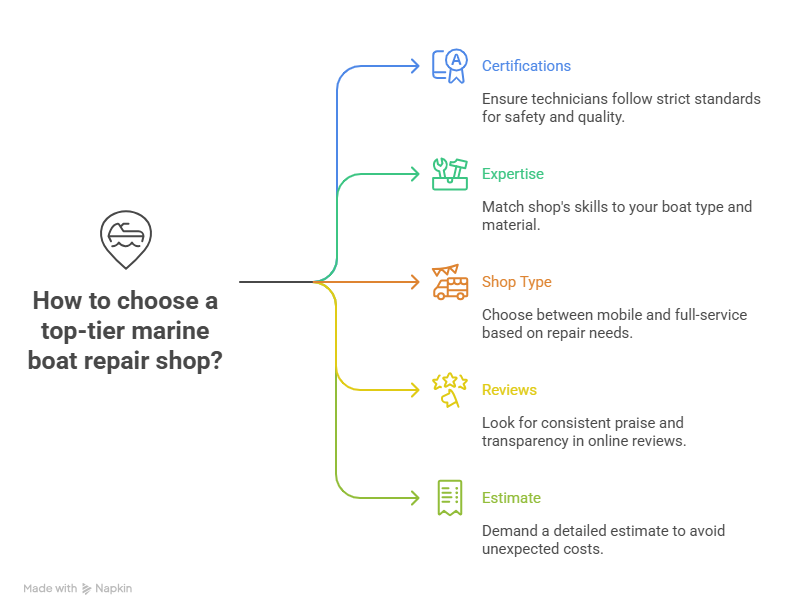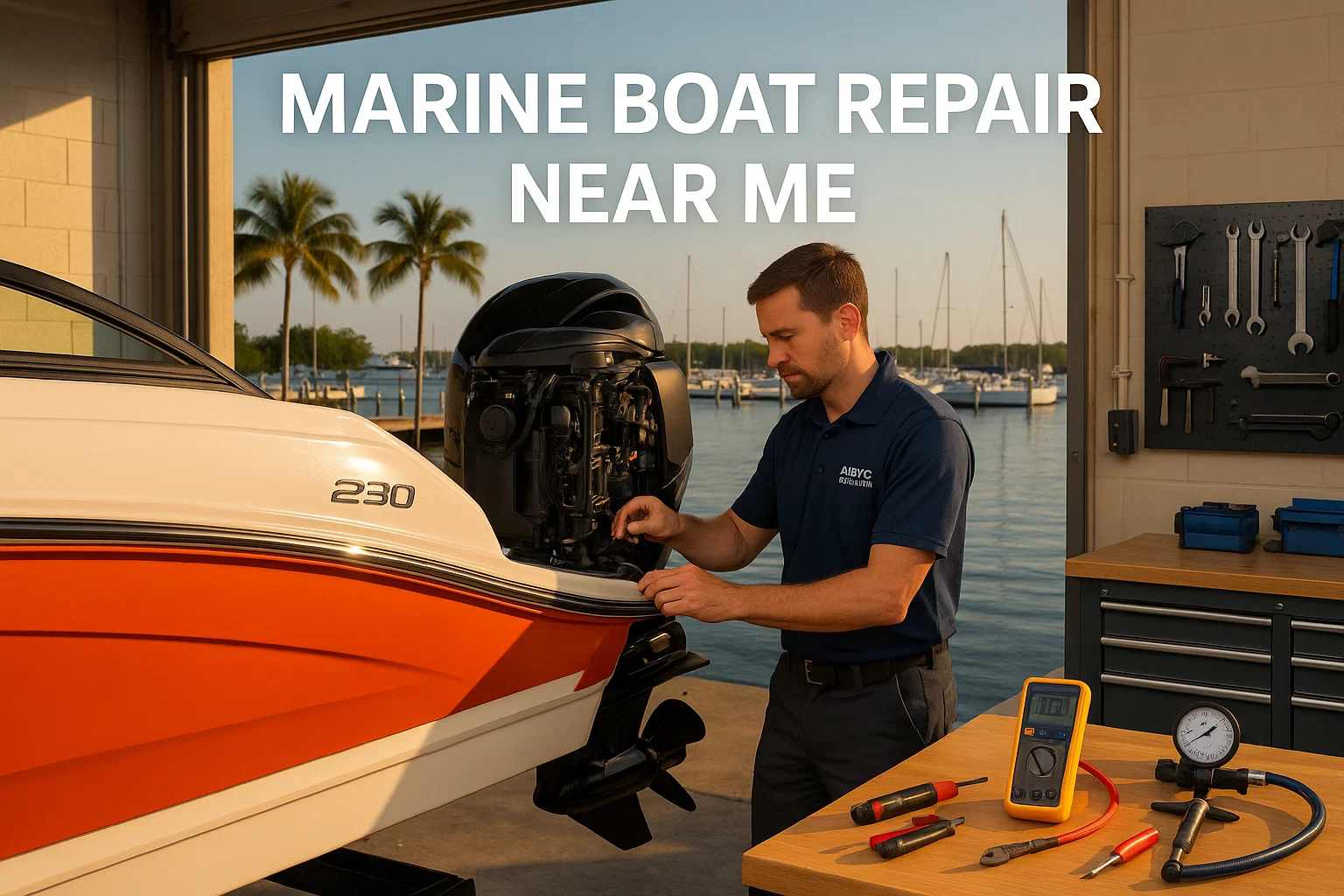Finding the Best Marine Boat Repair Near Me: 15 Years of Lessons from South Florida
I’ve been fixing boats in Miami and Fort Lauderdale for 15 years, and I’ve seen every kind of repair nightmare—fried engines, botched fiberglass jobs, you name it. Last July, a guy named Carlos rolled into Dinner Key Marina with his Sea Ray 230, cursing a $1,200 bill from a shop that “fixed” his outboard but left it sputtering. Turned out, they skipped a fuel pressure test—classic rookie move. Finding a reliable marine boat repair near me isn’t just about Googling; it’s about knowing who’s got the skills to keep your boat running without draining your wallet. Here’s my playbook for picking a shop that’ll treat your vessel like it’s their own.
What Makes a Top-Tier Marine Boat Repair Shop?
A great shop isn’t just about shiny tools—it’s about expertise and trust. I’ve worked at enough marinas to know what separates the pros from the amateurs. Here’s what you need to look for to ensure your boat gets the care it deserves.
Why Are Certifications Crucial for Marine Repairs?
Certifications are your first line of defense against shoddy work. I got my ABYC certification in 2010, and it’s saved my clients countless headaches. Look for shops with ABYC-certified technicians—they follow strict standards for fuel and electrical systems, keeping your boat safe. Also, check for manufacturer-specific training for brands like Yamaha or Mercury. Last summer, I fixed a Volvo Penta inboard for a client at Bahia Mar—another shop missed a fault code because they didn’t have the right diagnostic scanner. Without those credentials, you’re rolling the dice.
How Do I Match a Shop’s Expertise to My Boat?
Not every mechanic can handle every boat. I learned this the hard way when I tried fixing a wooden sailboat’s hull in 2012—totally different from fiberglass. Ask if the shop knows your boat type (e.g., center console, sailboat), hull material (fiberglass, aluminum, wood), and engine (outboard, inboard, diesel). A buddy at Key Biscayne had his aluminum pontoon patched by a fiberglass guy—leaked in a month. Match the shop’s skills to your vessel, or you’ll pay twice.
What’s the Deal with Mobile vs. Full-Service Shops?
Choosing between mobile mechanics and full-service yards depends on your needs. Mobile guys like me can handle oil changes or impeller swaps at your dock—saved a client $200 at Stiltsville last June. But for big jobs like engine repowers, you need a full-service yard with a lift. I’ve seen owners tow boats to shops in Coconut Grove for bottom painting, only to realize a mobile tech could’ve done it cheaper. Pick based on the job, not just convenience.
How Can I Vet Local Marine Repair Shops?
Finding a solid shop takes legwork, but it’s worth it to avoid horror stories. I’ve heard too many at Fort Lauderdale marinas—shops promising quick fixes, then delivering $3,000 surprises. Here’s how I’d hunt for a trustworthy marine boat repair near me.
Why Should I Talk to Other Boaters First?
Before you search “marine boat repair near me,” hit the docks. Boaters at your marina know who’s legit. Last spring, a guy at Bahia Mar tipped me off about a shop that nailed his Yamaha 200 repair for $800—spot-on estimate, no surprises. Ask about communication, timeliness, and if the bill matched the quote. Online reviews help, but focus on patterns—ignore one-off rants and watch for consistent red flags like missed deadlines.
What Should I Look for When Visiting a Shop?
A quick visit tells you more than any website. I walked into a shop in Miami once—tools everywhere, oil on the floor. No way I’d trust them with my Boston Whaler. A clean, organized shop screams professionalism. Check for modern diagnostic tools (e.g., oscilloscopes, brand-specific scanners) and staff who answer questions without rushing you. I saw a tidy shop at Coconut Grove last year fix a Sea Ray’s electrical system in two days—impressive.
How Do Online Reviews Help Find a Reliable Shop?
Reviews are gold if you read them right. A client at Key Biscayne found me through Yelp after another shop botched his fuel system—$1,500 down the drain. Look for reviews mentioning specific repairs (e.g., “fixed my Mercury outboard in 3 hours”) and consistent praise for transparency. If you see complaints about “unexpected charges,” run. I cross-check reviews with marina chatter to confirm a shop’s rep.

How Do I Decode a Marine Repair Estimate?
The bill can make or break your trust in a shop. I’ve seen owners cry over $5,000 surprises because they didn’t demand a clear estimate. Here’s how to read one and avoid getting burned.
What Should a Professional Estimate Include?
A good estimate is like a roadmap—it shows exactly where your money’s going. Last month, I gave a client at Stiltsville a breakdown: $80/hour labor, 3 hours, $150 for OEM impeller, $20 environmental fee, $350 total. Demand itemized parts (e.g., “fuel filter, $50”), labor hours, and fees. Vague quotes like “engine repair, $1,000” are trouble. A solid shop’s estimate is an open book.
Why Are Low Quotes a Red Flag?
Cheap quotes sound great but often hide problems. A shop in Fort Lauderdale quoted a guy $500 for a fuel system fix—used junk parts, failed in a week. Lowball prices can mean inexperienced techs, skipped diagnostics (I always use a $200 pressure tester), or bait-and-switch tactics. I’d rather pay $800 for a job done right than $400 for one I’ll redo. Compare estimates, but don’t chase the cheapest.
How Should Shops Handle Unexpected Repairs?
Surprises happen—corrosion, worn bearings—but a good shop stops and calls you. Last July, I found a cracked impeller housing on a Grady-White 208 at Dinner Key. I sent the owner a written change order: $200 for machining, approved before I touched it. Never let a shop proceed without your sign-off on a detailed change order. It keeps you in control and the bill honest.
FAQ: Common Questions About Marine Boat Repair Near Me
How Often Should I Service My Boat’s Engine?
I recommend a full check every 100 hours or annually—oil, filters, impeller. Last summer, a client at Coconut Grove skipped this and paid $2,000 for a seized Yamaha 150. Use ABYC-certified shops for thorough diagnostics. Check out local options like Sofia’s Marine Repair for reliable service.
What’s the Cost of a Typical Marine Repair?
Routine maintenance (oil changes, spark plugs) runs $75–$600. Major repairs like fuel systems or repowers? $150–$8,000. I fixed a Mercury outboard for $300 last month—matched the estimate. Always get a detailed quote to avoid surprises.
Can I Trust Mobile Marine Mechanics?
Mobile mechanics are great for small jobs—oil changes, wiring fixes. I saved a guy at Stiltsville $200 on an impeller swap last June. For big overhauls, go to a full-service yard. Check reviews and ask for ABYC certification.
How Do I Know If a Shop Is Experienced with My Boat?
Ask about their work with your boat type and engine. I’ve seen shops botch aluminum hulls because they only knew fiberglass. Last year, a Key Biscayne shop fixed a Sea Ray’s Volvo Penta perfectly—knew the engine inside out. Verify their expertise upfront.
Why Do Some Shops Charge So Much?
High costs often reflect quality—OEM parts, certified techs, proper diagnostics. A cheap shop quoted a buddy $400 for a fuel pump but used knockoff parts—failed in a month. My $800 fix with a $200 tester lasted years. You get what you pay for.
What Tools Should a Good Shop Have?
Look for brand-specific scanners (e.g., Yamaha’s YDIS), oscilloscopes, and pressure testers. I caught a 0.7-volt drop on a Bayliner’s wiring with my Fluke voltmeter—fixed for $250. Modern tools mean faster, accurate repairs.
How Can I Avoid Surprise Charges?
Demand a written estimate with labor, parts, and fees. I gave a client at Bahia Mar a $350 quote last month—no surprises. Insist on change orders for new issues. A good shop like Sofia’s Marine Repair keeps it transparent.
Table: Comparing Marine Repair Options Near Me
I put this table together from jobs I’ve seen in South Florida:
| Service Type | Description | Average Cost | Availability |
|---|---|---|---|
| Routine Maintenance | Oil changes, spark plugs, filters, impeller swaps | $75–$600 | Mobile, shops |
| Engine Repair | Fixes for outboard/inboard issues like fuel or cooling problems | $150–$8,000 | Full-service shops |
| Emergency Repairs | On-water or dockside fixes for sudden issues | $100–$3,000 | Mobile specialists |
| Mobile Marine Mechanic | On-site service at your marina or dock | $80–$160/hr | Select providers |
| Hull Repair | Fiberglass, aluminum, or wood hull fixes | $200–$5,000 | Specialized shops |
Conclusion: Your Boat Deserves the Best
Picking a marine boat repair near me isn’t just about fixing a breakdown—it’s about finding a shop you can trust for years. I’ve seen too many owners at Fort Lauderdale marinas regret choosing the cheapest quote. Here’s what I’ve learned:
- Check Credentials: ABYC certification and brand-specific training are non-negotiable.
- Match Expertise: Ensure they know your boat’s type, hull, and engine.
- Talk to Boaters: Marina gossip beats online searches—ask at your dock.
- Demand Clarity: A detailed estimate and change orders keep costs honest.
Start your search today. Walk your marina, talk to boaters, and visit a shop like Sofia’s Marine Repair. A great mechanic doesn’t just fix your boat—they protect your love for the water. Get it right, and you’ll be back on the waves worry-free.
Author Bio
I’m Alex, a 15-year marine mechanic with ABYC certification, fixing boats across Miami and Fort Lauderdale. I’ve serviced 200+ vessels, from Sea Rays to Boston Whalers, and I’m passionate about keeping boats running strong.


Leave a Reply